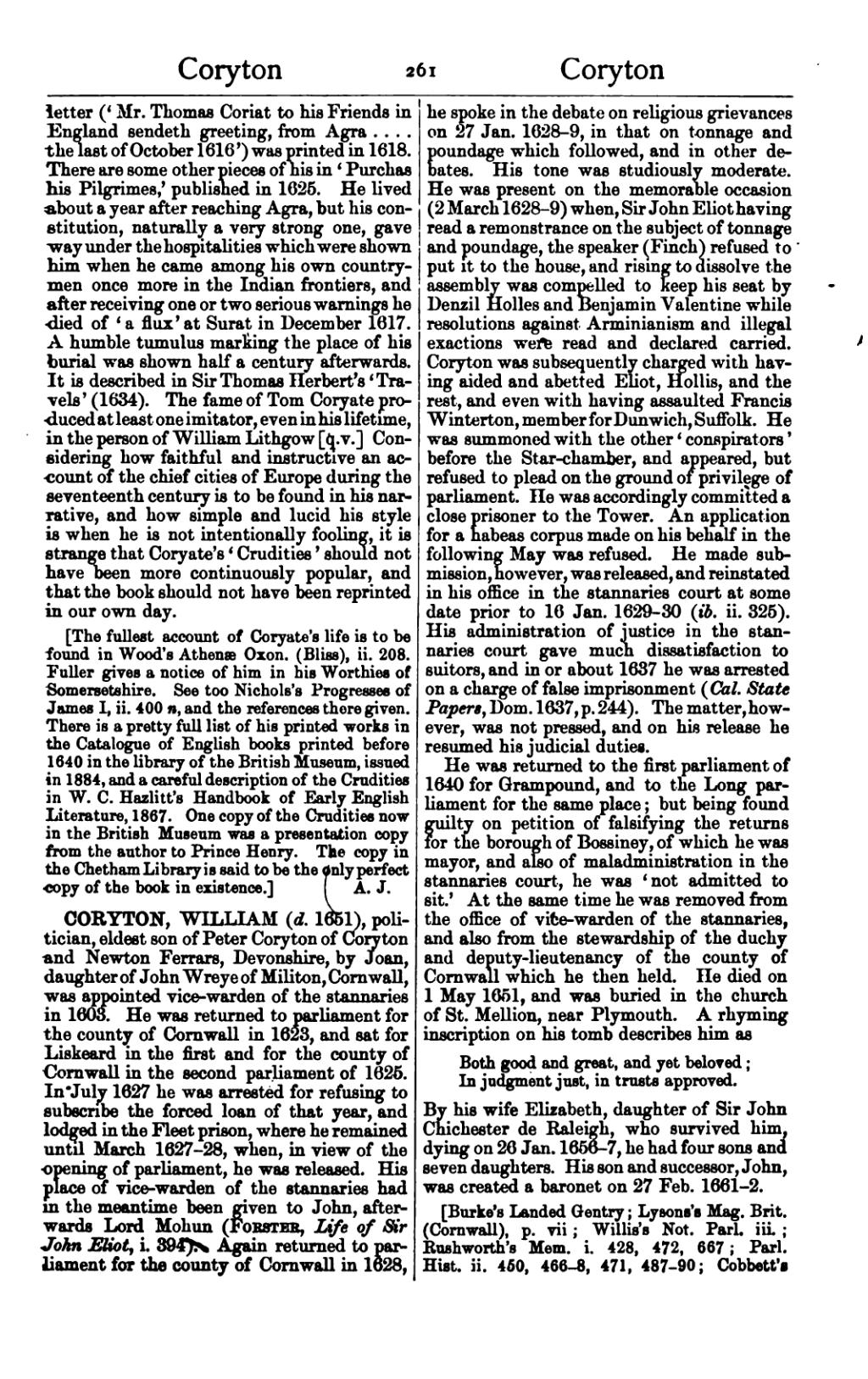letter (‘Mr. Thomas Coriat to his Friends in England sendeth greeting, from Agra .... the last of October 1616’) was printed in 1618. There are some other pieces of his in ‘Purchas his Pilgrimes,’ published in 1625. He lived about a year after reaching Agra, but his constitution, naturally a very strong one, gave way under the hospitalities which were shown him when he came among his own countrymen once more in the Indian frontiers, and after receiving one or two serious warnings he died of ‘a flux’ at Surat in December 1617. A humble tumulus marking the place of his burial was shown half a century afterwards. It is described in Sir Thomas Herbert's ‘Travels’ (1634). The fame of Tom Coryate produced at least one imitator, even in his lifetime, in the person of William Lithgow [q. v.] Considering how faithful and instructive an account of the chief cities of Europe during the seventeenth century is to be found in his narrative, and how simple and lucid his style is when he is not intentionally fooling, it is strange that Coryate's ‘Crudities’ should not have been more continuously popular, and that the book should not have been reprinted in our own day.
[The fullest account of Coryate's life is to be found in Wood's Athenæ Oxon. (Bliss), ii. 208. Fuller gives a notice of him in his Worthies of Somersetshire. See too Nichols's Progresses of James I, ii. 400 n, and the references there given. There is a pretty full list of his printed works in the Catalogue of English books printed before 1640 in the library of the British Museum, issued in 1884, and a careful description of the Crudities in W. C. Hazlitt's Handbook of Early English Literature, 1867. One copy of the Crudities now in the British Museum was a presentation copy from the author to Prince Henry. The copy in the Chetham Library is said to be the only perfect copy of the book in existence.]
CORYTON, WILLIAM (d. 1651), politician, eldest son of Peter Coryton of Coryton and Newton Ferrars, Devonshire, by Joan, daughter of John Wreye of Militon, Cornwall, was appointed vice-warden of the stannaries in 1603. He was returned to parliament for the county of Cornwall in 1623, and sat for Liskeard in the first and for the county of Cornwall in the second parliament of 1625. In July 1627 he was arrested for refusing to subscribe the forced loan of that year, and lodged in the Fleet prison, where he remained until March 1627–28, when, in view of the opening of parliament, he was released. His place of vice-warden of the stannaries had in the meantime been given to John, afterwards Lord Mohun (Forster, Life of Sir John Eliot, i. 394). Again returned to parliament for the county of Cornwall in 1628, he spoke in the debate on religious grievances on 27 Jan. 1628–9, in that on tonnage and poundage which followed, and in other debates. His tone was studiously moderate. He was present on the memorable occasion (2 March 1628–9) when, Sir John Eliot having read a remonstrance on the subject of tonnage and poundage, the speaker (Finch) refused to put it to the house, and rising to dissolve the assembly was compelled to keep his seat by Denzil Holles and Benjamin Valentine while resolutions against Arminianism and illegal exactions were read and declared carried. Coryton was subsequently charged with having aided and abetted Eliot, Hollis, and the rest, and even with having assaulted Francis Winterton, member for Dunwich, Suffolk. He was summoned with the other ‘conspirators’ before the Star-chamber, and appeared, but refused to plead on the ground of privilege of parliament. He was accordingly committed a close prisoner to the Tower. An application for a habeas corpus made on his behalf in the following May was refused. He made submission, however, was released, and reinstated in his office in the stannaries court at some date prior to 16 Jan. 1629–30 (ib. ii. 325). His administration of justice in the stannaries court gave much dissatisfaction to suitors, and in or about 1637 he was arrested on a charge of false imprisonment (Cal. State Papers, Dom. 1637, p. 244). The matter, however, was not pressed, and on his release he resumed his judicial duties.
He was returned to the first parliament of 1640 for Grampound, and to the Long parliament for the same place; but being found guilty on petition of falsifying the returns for the borough of Bossiney, of which he was mayor, and also of maladministration in the stannaries court, he was ‘not admitted to sit.’ At the same time he was removed from the office of vice-warden of the stannaries, and also from the stewardship of the duchy and deputy-lieutenancy of the county of Cornwall which he then held. He died on 1 May 1651, and was buried in the church of St. Mellion, near Plymouth. A rhyming inscription on his tomb describes him as
Both good and great, and yet beloved;
In judgment just, in trusts approved.
By his wife Elizabeth, daughter of Sir John Chichester de Raleigh, who survived him, dying on 26 Jan. 1656–7, he had four sons and seven daughters. His son and successor, John, was created a baronet on 27 Feb. 1661–2.
